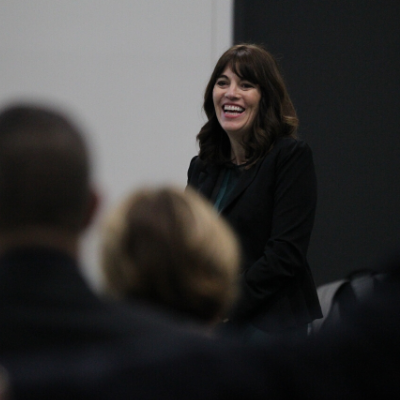Job longevity for public school superintendents is notoriously short. Three years, on average, is the oft-cited number. But a handful of years on the job isn’t enough to really do the job, said a pair of long-time superintendents Saturday in an AASA conference session on leadership for the long term.
“You need to be in a place for five years, 10 years to really start to do the hard work and heavy lifting,” said Susan Enfield, superintendent of 18,500-student Highline Public Schools in Burien, Wash., and the 2020 AASA Women in School Leadership Award recipient. Enfield has led her district for eight years.
Enfield and Kristine Gilmore, superintendent of the 7,000-student D.C. Everest Area School District in Weston, Wis., now in her 17th year on the job, spoke about the keys to becoming and staying superintendent over the long term. Among the two dozen or so administrators at the session, many also were veteran superintendents ─a reaffirmation of best practices and their common cause.
Staying on the job begins with finding the right fit, Enfield advised her peers. Job candidates need to match individual skills, personality, values and vision to the district from the start. “We tend to treat school systems as generically the same,” Enfield said. “They aren’t. You have to do your homework.”
That means having intense, perhaps difficult, conversations with district staff and school board members, both in applying for a job and in keeping it. People and places change, and superintendents need to adapt. Gilmore said she conducts deep reviews of her work with board members and staff every year.
“You need to be honest. Is the district really comfortable with your vision and aspirations,” said Gilmore. “Do they really support what you want to do, or is it just talk?”
Establish a tone and leadership style that is clear and understood by all, the superintendents said. Be genuine. Keep goals simple and constant. No one likes surprises, especially school board members.
The work of a superintendent is contextual. What works well in one place may not elsewhere. But one universal principle, said Enfield and Gilmore, is building a team that is unified, supportive and talented. It should be a mix of internal staffers up through the ranks, well-versed in the culture of the district and community, and external hires who bring new eyes and fresh thinking.
Trust your team, advised Gilmore. But don’t take them for granted, added Enfield, and assume it will always do the job in your absence or without guidance. Leaders are present.
School boards are “God’s gift to superintendents,” joked Enfield, who quickly noted she currently has a “dream board.” Gilmore concurred. But such is not always the case, and superintendents who stay on the job must constantly cultivate their relationships with board members.
“You have to invest time and effort,” said Enfield. “My board members get an immediate response from me when they call or text. I make sure there are no surprises when news breaks.”
Gilmore said board members should all get the same information, preferably at the same time. They should be given credit whenever possible. “You don’t have to prove you’re superintendent. You are superintendent. Power is the ability to give it away.”
Constant staff and community engagement is essential. Both superintendents described a variety of outreach efforts, from “Soup with the Superintendent” sessions with staff to “Lunch and Learn” with business leaders, parents and citizens. Both operate student leadership teams and family action committees, send personal notes of congratulations and have internal awards programs. Enfield hands out rubber ducks, an allusion to her childhood nickname, “Duck.”
In the end, Enfield and Gilmore both looped back to their initial message: Stick it out.
Being a superintendent means learning to get comfortable with the uncomfortable, said Gilmore. In times of crisis, it’s natural to want to hunker down, but that’s the time to especially reach out to staff, parents, the community. Hard times come and go; good times take time.
Resigning a superintendency after just a few years because it doesn’t seem to be working or for perceived greener pastures elsewhere is just quitting, said Enfield. It perpetuates the narrative that public education is failing.
“It’s so incredibly important that we go into this for the long-term,” she said. “Sometimes it’s not our choice to leave, but when it is, we need to choose to stay.”
(Scott LaFee is media relations director at UCSD Health in San Diego.)

Susan Enfield 
Susan Enfield and Kristine Gilmore present


